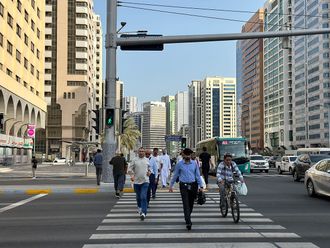
Dubai: Taking pictures of people, without their permission, and posting it on social media or sharing them through other means is a breach of privacy and punishable by UAE law. But did you know that the law also applies to pictures of people’s properties? If you take pictures of a person’s property, which can be easily identified as theirs, you should also ensure you take permission from them.
What the UAE’s laws say about violation of privacy online
According to the experts who spoke with Gulf News, breach of online privacy is primarily dealt with in Federal Decree Law No. 34 of 2021, which is also referred to as the Federal Cybercrimes Law. Additionally, the topic is also covered in the Federal Decree Law No. 31 of 2021 (Federal Penal Law) and Federal Decree Law No. 38 of 2021 (Federal Copyright Law).
1. Eavesdropping, interception, recording, communication, transmission or disclosure of conversations, communications or audio or video materials.
2. Taking photographs of others at any public or private place or preparing, communicating, exposing, copying or keeping electronic images thereof.
3. Spreading news, electronic images, photographs, footages, comments, data or information, even if true and correct, to harm such person.
4. Taking, communication or publication of photographs of the casualties, dead persons or victims of accidents or disasters without permission or consent of the concerned persons.
5. Tracking, detecting, disclosing, exposing, copying or keeping data of geographical sites of third parties.
Anyone who uses an electronic information system or any means of information technology to make any modification or manipulation of a recording, image or scene, with the intent to defame or offend another person shall also be punished by imprisonment for a period of no less than one year and a fine of no less than Dh250,000 and no more than Dh500,000, or one of these two penalties.
Hari Wadhwana, an Associate at OGH Legal, said that clauses 1 to 3 of this law may be relevant from the perspective of breach of individual privacy and also cited Articles from the Federal Penal Law and the Federal Copyright law, which may be applicable.
Article 431 of the Federal Penal Law states that any individual who interferes with the right to privacy and family life of individuals shall be sentenced to imprisonment and a fine if the said individual does the following:
1. Eavesdropping, or recording, or transmitting, through a device of any type, conversations done privately or by phone or any other device.
2. Taking or transmitting, through a device of any type, pictures of any person in private
“However, the Federal Penal Code also refers to an exception to the above rule and potential defense to the crime i.e. If the acts referred to in the preceding two cases occurred during a meeting or in full view of the attendees in the said meeting, then their consent shall be presumed,” Wadhwana said.
Similarly, Article 45 of the Federal Copyright Law also states that it will not be permissible for anyone to take a photograph of another person or an audio or video recording to keep, publish or distribute such products without permission of the person in it.
“Once again, there are exceptions to the above infringement … The exception deals more with public events, where the consent is assumed by participation or is expressly stated at the outset of such events,” Wadhwana said.
“It is critical for an individual to take the consent of another individual before recording an audio or video. Any recording made without such consent is deemed to breach an individual’s privacy. Further publication of such recording is also deemed as punishable and it is immaterial if the events set out are true and correct. The critical issue will be if the party being recorded is harmed, physically or in their reputation, due to the said publication,” Wadhwana said.
What should people keep in mind when taking pictures of people’s property?
While UAE laws do not specifically deal with taking pictures of individuals’ personal property, related protections do exist under the law, according to Wadhwana.
He spoke about how the Federal Cybercrimes Law defines personal data as follows: ‘Information or data of the natural persons relevant to their private lives, or that identify them or the person’s identity can be recognised through the direct or indirect connection of such information and data.’
“Article 6 of the law confirms that anyone who obtains or publishes personal data may be sentenced to imprisonment of not less than six months and/or pay a fine of not less than Dh20,000 up to a maximum of Dh100,000.
“Similarly, taking reliance of Article 44 of the Federal Cyber Law, if the picture taken of a property could result in a potential invasion of privacy, of an individual or the family. A court can take action of imprisonment and fine as stated above,” Wadhwana said.
“The critical aspect is if the picture taken can be linked to a specific individual i.e. if the name of owner of property is in the picture or the exact location of the property is shared which could potentially breach the owner’s information.
“Practically, one must keep in mind to not take pictures of someone’s private property which can be easily identifiable. Avoid taking pictures of the Makani number (outside the house), number plate on a car, name of the house, if published, address board along the house, which can easily identify the property owners. These are few of the examples and not exhaustive in nature,” Wadhwana said.
Jihene Arfaoui, a Dubai-based legal expert, also advised people to be aware of the laws that are applicable when it comes to taking pictures of a person’s home or car, for example.
“The individual’s private property, either movable or immovable, is part of the privacy of individuals that is protected by law. It is not permissible to physically or morally assault it ... or use it for any purpose whatsoever without the permission of its owners.”










